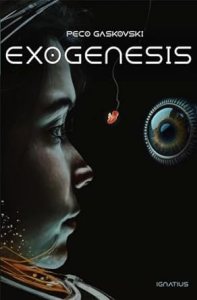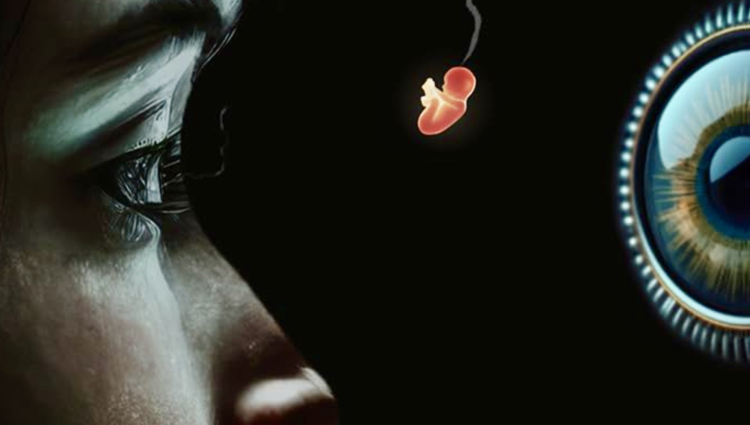Peco Gaskovski’s “Exogenesis” has been described as “Blade Runner meets the Benedict Option.” In the novel, a thousand-mile metropolis named Lantua has emerged from the collapse of the USA. Artificial birthing and strict reproductive control is enforced with hi-tech social conditioning, 24-7 monitoring by the state, and the total loss of freedom, disguised by smooth propaganda and state education.
Exogenesis by Peco Gaskovski (331 pages, Ignatius Press, 2023)
 Set in the not-too-distant future, David Pianault describes Exogenesis as “Blade Runner meets the Benedict Option.” In Peco Gaskovski’s debut novel, a thousand-mile metropolis named Lantua has emerged from the collapse of the USA. Artificial birthing and strict reproductive control is enforced with hi-tech social conditioning, 24-7 monitoring by the state, and the total loss of freedom, disguised by smooth propaganda and state education.
Set in the not-too-distant future, David Pianault describes Exogenesis as “Blade Runner meets the Benedict Option.” In Peco Gaskovski’s debut novel, a thousand-mile metropolis named Lantua has emerged from the collapse of the USA. Artificial birthing and strict reproductive control is enforced with hi-tech social conditioning, 24-7 monitoring by the state, and the total loss of freedom, disguised by smooth propaganda and state education.
The alternative, country-dwelling Benedites are Mennonites who genuflect. Field commander Maelin Kivela—working for the Lantuan authorities— oversees the forced sterilization of Benedites, but she has a secret past that threatens not only her way of life but the whole Lantuan civilization. A gripping thriller with a tender heart, Exogenesis was one of my most recent forays into the world of contemporary fiction by Catholic authors.
Wanting to learn more, I engaged in this conversation with Peco Gaskovski:
DL: Thanks for responding. Some personal questions first: Are you married? Children? Where do you live?
PG: My wife Ruth and I have been married for twenty years and have three children, ranging in age from late childhood to young adult. We live in Canada within the comforts of suburbia, but on the borders of Mennonite country where people still travel by horse and buggy and speak in low German dialects. Being so close to this anachronistic culture, and in regular contact with Mennonites in their shops and markets, is one of the truest comforts of living here.
DL: What is your religious affiliation?
PG: I’m Macedonian Orthodox by birth and continue to practice within the Orthodox tradition, but my faith has also been informed by other older traditions within Christianity. I tend to think most naturally at the “mere Christian” level.
DL: What are your writing credits?
PG: I’ve self-published a few novels in the past, but Exogenesis is the first to be released through an established publisher (Ignatius Press). I also periodically write essays online at “Pilgrims in the Machine” and “School of the Unconformed,” both of which are focused on the impact of technology on what it means to be human. In 1882 Nietzsche said God was dead, but in 2024 transhumanists are saying we can become gods through machines and biotechnology. The Western mind has gone through a dizzying time in recent centuries, and our collective vertigo has only intensified in recent decades. I’m interested in understanding where we are now, and in how we might stay grounded in reality.
DL: What sparked your novel Exogenesis?
PG: Today we’re seeing widening social divisions between progressives and conservatives, while digital and emerging technologies are changing how we conceive of ourselves and how we function mentally, socially, bodily, and in relation to nature. In writing the novel, I kept asking myself, “What might happen in one or two hundred years if things keep going in this direction?” Exogenesis is an imaginative answer to a complex question.
DL: Do you have further novels planned?
PG: Possibly a prequel or sequel to Exogenesis. My wife and I are also collaborating on a nonfiction book to help individuals and families live in healthier relationship with technology. We call it “unmachining” the mind.
DL: How would you describe Exogenesis’ genre? Sci fi? Dystopia? Thriller? Horror? Fantasy?
PG: Exogenesis is science fiction and dystopia, yet a dystopia with hope—a “dys-hopia,” one might say. But that isn’t really a new genre. Tolkien coined the literary term “eucatastrophe” to mean much the same thing. He originally used the term in connection with fairy tales, but it also describes the Christian worldview, and most of all the Crucifixion: a totally unexpected and cosmic reversal in the face of impossible odds. Exogenesis is not an overtly religious story, yet threads of this same eucatastrophe are woven throughout it.
DL: Is there a future for authors in writing novels?
PG: I hope so. We need writers of fiction to better understand our world and each other. Facts and abstractions are helpful, but they aren’t enough. C.S. Lewis described literature as a paradox, one that invites us to lose ourselves yet become enlarged through the imaginations of others. Reading novels can be a form of temporary transcendence.
Part of the joy of writing is creating this experience, and is maybe one of the reasons people will probably keep writing, despite the effort it takes. For some, I think, writing can also feel like a compulsion, something they have to do regularly to feel human.
In the near future, one of the challenges that novelists might encounter is AI. It’s not just that AI might be writing pop fiction bestsellers in a few years. It’s that access to AI tools for novelists—which are already available—bring the risk of making the writer’s mind complacent, unwilling to do the hard work of having to dig or patiently wait for inspiration.
To some, AI might seem like just another tool and convenience, yet our society is filled with convenience. Convenience is not a bad thing in itself, but as a philosophy for living it’s death. To be fully human means to work, to exert effort. I sweat, therefore I am.
DL: Given the new media, are there better ways to tell stories in our culture? If so, what and how?
PG: I’m not all that compelled by the “new media,” if it means things we read or see on a digital screen. I’m a bit old-fashioned, and still believe the best way to tell stories is through oral telling or reading out loud off paper, and preferably with emotion. Most of us don’t read novels theatrically, of course, although audiobooks can fill that need—which makes them the only “new” storytelling medium that I truly appreciate.
DL: What advice would you give to a budding author?
PG: I have always loved this advice from Ernest J. Gaines: “Read, read, read, write, write, write.” An author’s mind benefits from an interplay between his or her own literary mind and the minds of other writers. For people of faith I would add one more sentence: “Pray, pray, pray.” This is essentially the same advice that was given to me by Catholic author Michael O’Brien a few years ago, when I had a chance to meet him in person. I would also recommend taking a look at Michael’s “open letter to fellow writers and artists,” which can be found online and shimmers with insights.
The Imaginative Conservative applies the principle of appreciation to the discussion of culture and politics—we approach dialogue with magnanimity rather than with mere civility. Will you help us remain a refreshing oasis in the increasingly contentious arena of modern discourse? Please consider donating now.


